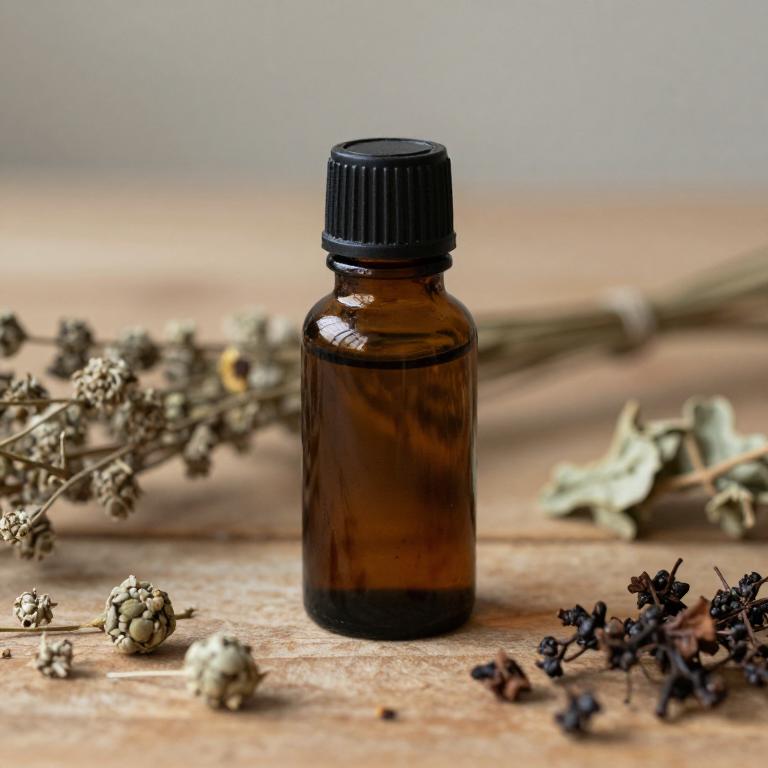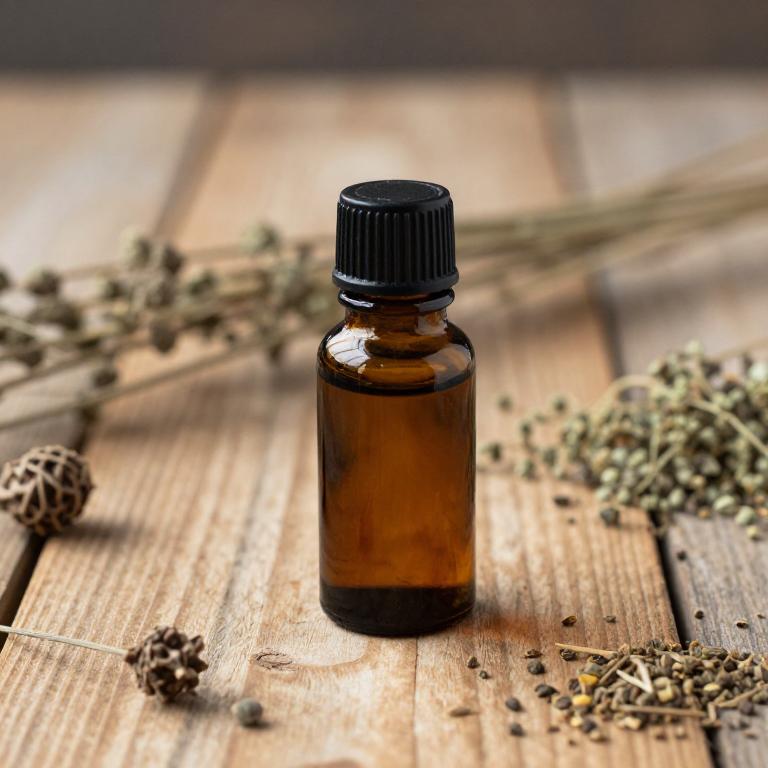10 Best Herbal Essential Oils For Difficulty Eating

Herbal essential oils can be beneficial for individuals experiencing difficulty eating by stimulating appetite and improving digestion through their aromatic properties.
Oils like peppermint, ginger, and citrus are commonly used to ease nausea and promote a sense of well-being that may encourage eating. When used in diffusers or applied topically with a carrier oil, these essential oils can help reduce anxiety and discomfort associated with eating. However, it is important to consult a healthcare professional before using essential oils, especially for those with underlying health conditions or allergies.
Overall, while they can support eating difficulties, essential oils should be used as a complementary rather than a standalone treatment.
Table of Contents
- 1. Fennel (Foeniculum vulgare)
- 2. Peppermint (Mentha piperita)
- 3. Black pepper (Piper nigrum)
- 4. Ginger (Zingiber officinale)
- 5. Licorice (Glycyrrhiza glabra)
- 6. Turmeric (Curcuma longa)
- 7. Rosemary (Rosmarinus officinalis)
- 8. Ceylon cinnamon (Cinnamomum verum)
- 9. Cumin (Cuminum cyminum)
- 10. Thyme (Thymus vulgaris)
1. Fennel (Foeniculum vulgare)

Foeniculum vulgare, commonly known as fennel, is a herb widely used in aromatherapy for its calming and digestive properties.
Its essential oil, derived from the seeds, contains compounds like anethol and limonene, which are known to support digestive health and ease gastrointestinal discomfort. For individuals experiencing difficulty eating, such as those with nausea, bloating, or reduced appetite, fennel essential oil may help soothe the digestive system and promote a sense of well-being. When used in diffusers or diluted for topical application, it can reduce stress-related digestive issues that may contribute to eating difficulties.
However, it is important to consult with a healthcare professional before using essential oils, especially for those with existing medical conditions or who are pregnant.
2. Peppermint (Mentha piperita)

Mentha piperita, commonly known as peppermint, is a popular herb whose essential oil is widely used for its calming and digestive benefits.
The essential oil of peppermint contains active compounds like menthol and menthone, which can help alleviate symptoms of difficulty eating by reducing nausea and improving appetite. It is often used in aromatherapy to soothe the digestive system and ease feelings of bloating or indigestion. Peppermint oil can be applied topically or inhaled to provide a refreshing and relaxing effect that supports overall digestive comfort.
However, it is important to consult a healthcare professional before using peppermint oil, especially for those with existing medical conditions or who are pregnant.
3. Black pepper (Piper nigrum)

Piper nigrum, commonly known as black pepper, contains essential oils that have been traditionally used to support digestive health.
The essential oils derived from black pepper, particularly those containing compounds like piperine, may help stimulate the digestive system and improve appetite. These oils can be used in aromatherapy or diluted in carrier oils to promote better eating habits in individuals experiencing difficulty consuming food. Piper nigrum essential oils are believed to enhance the production of digestive enzymes, which can aid in nutrient absorption and reduce feelings of bloating or discomfort.
However, it is important to consult with a healthcare professional before using these oils, especially for individuals with existing medical conditions or those taking medications.
4. Ginger (Zingiber officinale)

Zingiber officinale, commonly known as ginger, is widely recognized for its potential therapeutic benefits, including its use in addressing difficulty eating.
The essential oils derived from ginger contain compounds such as gingerol and shogaol, which have anti-inflammatory and digestive properties that may help alleviate nausea and improve appetite. These oils can be used in aromatherapy or diluted in carrier oils to support digestive comfort and stimulate gastric activity. Some studies suggest that ginger essential oils may help reduce gastrointestinal discomfort, making it a useful natural remedy for individuals experiencing eating difficulties.
However, it is important to consult with a healthcare professional before using essential oils, especially for those with existing medical conditions or who are pregnant.
5. Licorice (Glycyrrhiza glabra)

Glycyrrhiza glabra, commonly known as licorice root, is traditionally used in herbal medicine for its potential benefits in addressing difficulty eating, often referred to as dysphagia.
The essential oils derived from this plant contain compounds like glycyrrhizin and flavonoids, which may help reduce inflammation in the throat and gastrointestinal tract, thereby easing swallowing difficulties. These oils are sometimes used in aromatherapy or as part of herbal remedies to soothe irritation and promote digestive comfort. However, it is important to note that while licorice root has historical use, its essential oils should be used with caution and under professional guidance, as they may have potent effects and potential side effects.
Always consult a healthcare provider before using licorice essential oils for medical conditions.
6. Turmeric (Curcuma longa)

Curcuma longa, commonly known as turmeric, contains essential oils that have been studied for their potential benefits in addressing difficulty eating, often referred to as dysphagia.
These essential oils, derived from the rhizomes of the plant, contain bioactive compounds such as curcuminoids and volatile oils, which possess anti-inflammatory and antioxidant properties. Some research suggests that these oils may help reduce inflammation in the digestive tract, potentially improving swallowing function and overall digestive comfort. However, while preliminary studies are promising, more clinical research is needed to confirm their efficacy in treating dysphagia.
As with any herbal remedy, it is important to consult a healthcare professional before using curcuma longa essential oils, especially for individuals with existing medical conditions or those taking medications.
7. Rosemary (Rosmarinus officinalis)

Rosmarinus officinalis, commonly known as rosemary, is a herb whose essential oil has been traditionally used for its stimulating and digestive properties.
The essential oil of rosemary contains compounds like 1,8-cineole and camphor, which can help improve appetite and ease the process of eating for individuals experiencing difficulty in consuming food. Its aromatic properties may also help reduce nausea and promote a sense of well-being, making it easier for people to engage in meals. When used aromatically or in diluted form, rosemary essential oil can support digestive function and encourage a more comfortable eating experience.
However, it is important to use this oil responsibly and consult with a healthcare professional, especially for those with existing health conditions or who are pregnant.
8. Ceylon cinnamon (Cinnamomum verum)

Cinnamomum verum, also known as true cinnamon, contains essential oils that have been traditionally used to support digestive health and ease difficulty eating.
The essential oils derived from its bark contain compounds like cinnamaldehyde and eugenol, which may help stimulate digestion and reduce bloating. These oils can be used in aromatherapy or diluted in a carrier oil for topical application to soothe gastrointestinal discomfort. However, it is important to consult with a healthcare professional before using cinnamon essential oils, as they may interact with certain medications or conditions.
While some people find relief from using cinnamon essential oils for eating difficulties, more research is needed to fully understand their efficacy and safety.
9. Cumin (Cuminum cyminum)

Cuminum cyminum, commonly known as cumin, is a herb widely used in traditional medicine for its aromatic essential oil, which is derived from the seeds through steam distillation.
This essential oil contains compounds like limonene and cumin aldehyde, which are believed to stimulate digestive enzymes and improve gut motility. Cumin essential oil may help alleviate symptoms of difficulty eating by reducing bloating, enhancing appetite, and promoting a sense of fullness. It is often used in aromatherapy or diluted in carrier oils for topical application or inhalation.
However, it is important to consult a healthcare professional before using cumin essential oil, especially for individuals with existing medical conditions or those taking medications.
10. Thyme (Thymus vulgaris)

Thymus vulgaris, commonly known as thyme, is a herbal plant whose essential oil has been traditionally used for its potent aromatic and therapeutic properties.
The essential oil of thyme contains compounds like thymol and carvacrol, which possess antimicrobial and anti-inflammatory effects, making it potentially beneficial for individuals experiencing difficulty eating due to oral or gastrointestinal issues. When used in aromatherapy or diluted in carrier oils, thyme essential oil may help stimulate appetite and improve the overall sense of taste and smell, which are crucial for eating. However, it is important to consult with a healthcare professional before using thyme essential oil, especially for those with existing health conditions or who are pregnant.
Its use should always be done with proper dilution to avoid skin irritation or adverse reactions.